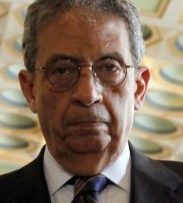 |
‘What is happening in Libya differs from the aim of imposing a no-fly zone,’ said the Arab League’s Amr Moussa. |
CAIRO — The Arab League secretary general, Amr Moussa, deplored the broad scope of the US-European bombing campaign in Libya yesterday and said he would call a new league meeting to reconsider Arab approval of the Western military intervention.
Moussa said the Arab League’s approval of a no-fly zone on March 12 was based on a desire to prevent Moammar Khadafy’s air force from attacking civilians and was not designed to embrace the intense bombing and missile attacks — including on Tripoli, the capital, and on Libyan ground forces — that have filled Arab television screens for the last two days.
“What is happening in Libya differs from the aim of imposing a no-fly zone,’’ he said in a statement on the official Middle East News Agency. “And what we want is the protection of civilians and not the shelling of more civilians.’’
Moussa’s declaration suggested that some of the 22 Arab League members were taken aback by what they have seen and wanted to modify their approval lest they be perceived as accepting outright Western military intervention in Libya. Although the eccentric Khadafy is widely looked down on in the Arab world, Middle Eastern leaders and their peoples traditionally have risen up in emotional protest at the first sign of Western intervention.
A shift away from the Arab League endorsement, even partial, would constitute an important setback to the US-European campaign. Western leaders brandished the Arab League decision as a justification for their decision to move militarily and as a weapon in the debate to obtain a UN Security Council resolution two days before the bombing began.
But as US and European military operations entered their second day, most Arab governments maintained public silence, and the strongest expressions of opposition came from the greatest distance. Presidents Hugo Chavez of Venezuela, Daniel Ortega of Nicaragua, Evo Morales of Bolivia, and Fidel Castro of Cuba condemned the intervention and suggested that Western powers were seeking to acquire Libya’s oil reserves rather than limit the bloodshed in the country.